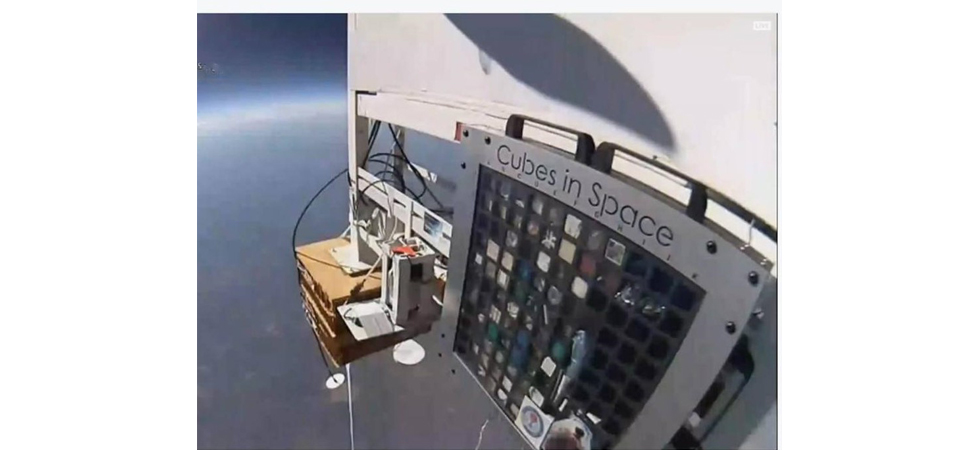Young minds girdle to take Nepal into space

By Shaurya Kshatri
Kathmandu, Mar. 22: Scientists have carried out several peculiar yet imaginative experiments in space -- be it brewing beer or growing mouse embryos in zero gravity. But there are no peculiar experiments or odd questions in science. Thinking out of the box is part and parcel of scientific thinking. Bearing this in mind, in 1988, a German Researcher U. Engelmann sent samples of bull sperm into orbit aboard a European Space Agency rocket. The rationale behind was simple -- to address the question of how changes in gravitational force affect the ability of sperm to fertilise eggs.
Now, young inquisitive Nepali minds also have the opportunity to devise their own unique experiments so that they too can quench their curiosities about the mysteries of space.
Through the programme called Cubes in Space, Nepali students aged between 11 to 18 years can craft experiments to fit inside a small plastic cube, which are then sent up either in a NASA sounding rocket or in a zero-pressure scientific balloon.
NASO Nepal (Nepal Astronomical Society) signed an MoU with idoodlEDU Inc., a US-based NGO, hosting the Cubes in Space to enroll 50 Nepali students in the programme. “Under the agreement, two experiments from among the 50 students will be selected to launch into space,” said NASO chairperson Suresh Bhattarai.
The students will have to send in a detailed proposal to Cubes in Space elaborating on the experiment they are willing to carry out along with the research question. NASO Nepal will be organising a five-week special workshop from April 10 to May 15 in order to provide lessons on making proposals. “The workshop will provide introduction to design space exploration mission, launch flight and educate them on conditions for space or near-space environment, and so on,” added Bhattarai.
Experts in the field will be hosting the workshop. The students will get the opportunity to learn under veteran space scientists like Dr. William Moore, planetary scientist from Hampton University and Frank Peri, Director of NASA’s Safety and Mission Assurance Office. Each student has to pay around Rs. 16,000 to participate in the five-week workshop.
“Since 2014, we have launched almost a thousand experiments from 73 countries,” according to Amber Agee-DeHart, founder of Cubes in Space and president of idoodlEDU. The programme was started to instill inquisitive thinking and the audacity to ask bold and relevant questions.
Another project to launch Sounding Rockets in Nepal
The Cubes in Space, however, isn’t the first time that Nepalis are striving to launch something in space. On April 18 of 2019, Nepal sent its first satellite ‘NepaliSat-1’ into space to gather detailed geographical information of the country.
Moreover, as part of the Japan-supported Joint Global Multi-Nation Birds Satellite Project, a team of Nepali engineers from ORION Space prepared the country’s first-ever Picosatellite.
However, it hasn’t been able to get off the ground as yet.
Now Open Rocketry And Space Society (ORASS), a chapter of SEDS-Nepal, has built a sounding rocket -- the first of its kind in Nepal known as Garuda. "Working in the field of structure, propulsion system, mechanical design and simulations as a member of Garuda team has always been fun and a growing experience. I am an undergrad student of Paschimanchal Campus, Pokhara pursuing a degree in mechanical engineering. I have always spent my time learning engineering technology that has advanced human civilisations,” said Aplesh Mahato.
The team of young engineers successfully completed the test launch on March 19 from Army Barracks, Sindhuli.
Recent News

Do not make expressions casting dout on election: EC
14 Apr, 2022
CM Bhatta says may New Year 2079 BS inspire positive thinking
14 Apr, 2022
Three new cases, 44 recoveries in 24 hours
14 Apr, 2022
689 climbers of 84 teams so far acquire permits for climbing various peaks this spring season
14 Apr, 2022
How the rising cost of living crisis is impacting Nepal
14 Apr, 2022
US military confirms an interstellar meteor collided with Earth
14 Apr, 2022
Valneva Covid vaccine approved for use in UK
14 Apr, 2022
Chair Prachanda highlights need of unity among Maoist, Communist forces
14 Apr, 2022
Ranbir Kapoor and Alia Bhatt: Bollywood toasts star couple on wedding
14 Apr, 2022
President Bhandari confers decorations (Photo Feature)
14 Apr, 2022










